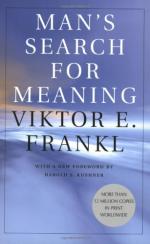
|
| Name: _________________________ | Period: ___________________ |
This test consists of 15 multiple choice questions and 5 short answer questions.
Multiple Choice Questions
1. What did the more "prominent" prisoners, the Capo, develop in camp?
(a) Major depressive disorder.
(b) Delirium.
(c) Dementia.
(d) Delusions of grandeur.
2. How does Frankl write that Freudian psychotherapy deals with spiritual issues?
(a) Frankl writes that spirituality is dealt with by Freudian psychologists as a central issue in life, but it should be addressed with religious leaders.
(b) They are dealt with directly, and with respect for the difficulty that many patients have with these issues.
(c) They are not dealt with directly, but they are seen as having instinctual roots.
(d) Spiritual issues are not dealt with in psychotherapy.
3. For Frankl, what makes life meaningful and purposeful?
(a) Humanity.
(b) Love.
(c) Hope for the future.
(d) Spiritual freedom.
4. What is "hyper-intention"?
(a) When an excess of intention makes the intended goal impossible.
(b) When a person is so intent on a goal that they are hyper.
(c) This term is not used in the book.
(d) When an excess of energy creates a lack of meaning.
5. Can logotherapy be used with neurotic individuals?
(a) Frankl writes that they should be treated medically.
(b) Frankl argues that they should not use logotherapy until they are treated medically.
(c) Frankl writes that they, in particular, can benefit from logotherapy.
(d) Frankl believes that they should be seen first by someone using a more dogmatic approach.
6. What does Frankl term "pan-determinism".
(a) The tendency in therapy for patients to blame others rather than taking responsibility for their own lives.
(b) The idea that religious ideas are unimportant.
(c) The psychoanalytic tendency to ignore that man makes some decisions.
(d) This is not a term used in the text.
7. Looking back at the experience of living in a concentration camp, what does Frankl say is the most wonderful feeling?
(a) That there is no returning to camp.
(b) That so many survived.
(c) That the SS has been punished.
(d) That there is nothing left to fear -- except God.
8. Frankl writes that values do not push, but pull people. Why does he make this distinction?
(a) To demonstrate that people are born with values.
(b) To show that there is always freedom of choice.
(c) To argue that man does not create values, but instead recognizes them.
(d) To show that they are part of the inner life of man.
9. What does Frankl call "existential frustration"?
(a) A frustration that stems from the dull nature of existence.
(b) A frustration that results when suffering does not lead to meaning.
(c) The kind of frustration that comes from having superficial relationships.
(d) The result of frustrating man's will to meaning.
10. What does Frankl suggest is the meaning of life?
(a) Love.
(b) It is different for each individual.
(c) Creative work is the purpose of life.
(d) Charitable work or work that advances the common causes of humanity.
11. In logotherapy, how is the search for meaning seen?
(a) As a game because there is no meaning.
(b) As important, but not necessary.
(c) As a primary motivational force.
(d) As less important than just accepting suffering.
12. What does the author have to do to satisfy the SS while filling in for the senior block warden?
(a) Treat his patients to the best of his ability.
(b) Create a full report on the medicines and other supplies that he used.
(c) Keep the hut where sick inmates were located clean and orderly.
(d) Create full written reports on each of his patience.
13. What does Frankl argue man determines about his life?
(a) Man decides whether or not to suffer.
(b) Man decides what he will be.
(c) Man decides if he will listen to his inner voice.
(d) Man decides whether or not he will live in love.
14. How did Frankl himself realize he was free?
(a) He returned to work, and was treated with respect by his clients for the first time in years.
(b) Walking alone in a field, he fell to his knees, recalling his former prayers for freedom.
(c) When walking down the street, someone called his name, and he realized that he had his identity back.
(d) He saw a former fellow prisoner, and they realized how different they each looked.
15. What happened, according to the author, to the instinct to violence in the prisoners?
(a) It grew as they saw more and more violence.
(b) It completely disappeared as they learned what being a victim was like.
(c) They reacted more and more irritably when faced with violence.
(d) It decreased as they saw the harm violence made.
Short Answer Questions
1. What is the name of the school of therapy that Frankl stands for?
2. What did the camp doctor give his prisoners after they were liberated?
3. Why does Dr. Frankl describe that he sits next to corpses "crawling with lice" but they did not bother him?
4. What is the author's tone of voice in this, the second section, of the book?
5. How does Frankl's understanding of individual meaning differ from that of Jean-Paul Sartre?
|
This section contains 956 words (approx. 4 pages at 300 words per page) |

|




